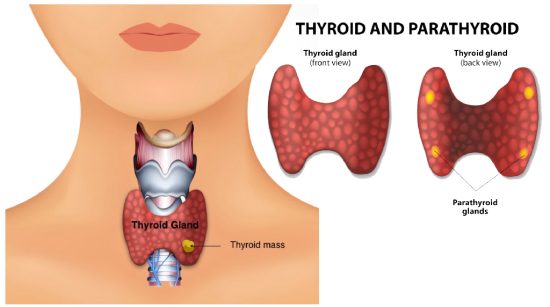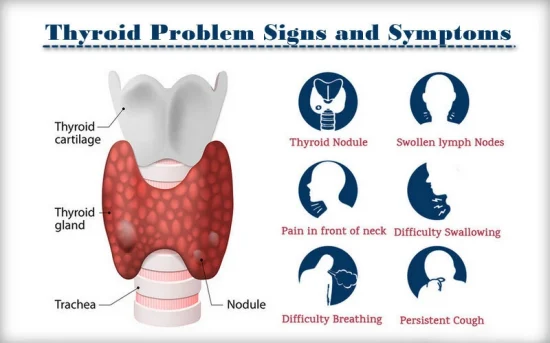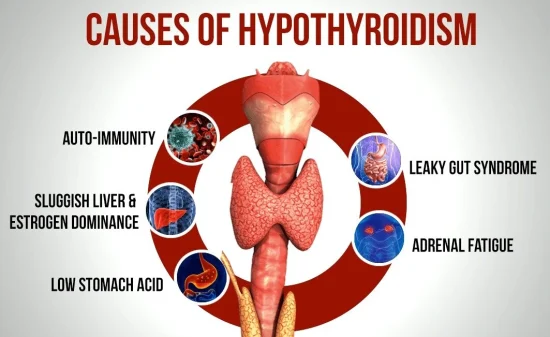
Best Homeopathic Medicine for Thyroid
Thyroid disorders, especially hypothyroidism, are becoming increasingly common in today’s world. Many people suffering from thyroid conditions are exploring natural remedies like homeopathic treatment for hypothyroidism, seeking holistic solutions that address both symptoms and the root cause. Homeopathy, with its focus on individualized care, can offer an effective way to manage thyroid imbalances naturally.
In this guide, we’ll delve into how the thyroid works, the common causes of thyroid disorders, and how homeopathic medicine for thyroid can help restore balance to your body.
What is a Thyroid Gland?
The thyroid gland is a small, butterfly-shaped gland located in the front part of the neck. Despite its size, it plays a critical role in regulating several bodily functions, particularly metabolism. These hormones control how the body uses energy and influences key functions such as breathing, heart rate, and body temperature.
When it isn’t functioning correctly, it can lead to either an overproduction (hyperthyroidism) or underproduction (hypothyroidism) of hormones, both of which can disrupt normal body processes.

What Are the Symptoms of Thyroid?
Symptoms of Hypothyroidism:
Hypothyroidism is characterized by an underactive thyroid, where the gland doesn’t produce enough hormones. Symptoms may develop slowly, often being mistaken for other conditions:
Fatigue and Weakness
Feeling tired even after rest, with reduced stamina and physical energy throughout the day.Weight Gain
Unexplained weight gain despite no changes in diet or physical activity, due to a slowed metabolism.Cold Intolerance
Increased sensitivity to cold temperatures, often feeling chilly even in mild weather.Dry Skin and Hair
Skin becomes rough, dry, and flaky; hair may become brittle and fall out more easily.Constipation
Slowed digestion leads to infrequent or difficult bowel movements.Depression or Low Mood
Mood swings, feelings of sadness, and mental fog are common with low thyroid hormone levels.Slow Heart Rate
A reduced pulse and low energy levels can be signs of hormonal imbalance.Swelling in the Neck (Goiter)
Enlargement of the thyroid gland may appear as a swelling or fullness in the front of the neck.Irregular or Heavy Menstrual Periods
Women may experience heavier, longer, or irregular periods due to hormonal disruption.Memory Problems and Difficulty Concentrating
“Brain fog,” forgetfulness, or trouble focusing can be signs of an underactive thyroid.
Symptoms of Hyperthyroidism:
Hyperthyroidism, on the other hand, occurs when it is overactive and produces too many hormones. This can result in:
Unexplained Weight Loss
Losing weight despite normal or increased appetite, due to a faster metabolic rate.Rapid or Irregular Heartbeat (Palpitations)
The heart may feel like it’s racing, pounding, or skipping beats, even at rest.Increased Sweating and Heat Intolerance
Excessive sweating and discomfort in warm weather, due to an overactive system.Nervousness and Anxiety
Feeling restless, anxious, or irritable without any clear reason.Tremors in Hands or Fingers
Fine shaking, especially noticeable when holding objects or extending the hands.Frequent Bowel Movements
Increased frequency of bowel movements or mild diarrhea, often without abdominal pain.Fatigue or Muscle Weakness
Feeling tired but wired, with weakness particularly in the upper arms and thighs.Sleep Disturbances
Trouble falling asleep or staying asleep, despite feeling physically drained.Thinning Hair and Fragile Skin
Hair may fall out easily, and the skin becomes smooth but thin and sensitive.Irregular Menstrual Cycle or Fertility Issues
Women may experience lighter periods or missed cycles due to hormonal imbalance.Bulging Eyes (Graves’ Disease)
A specific sign, in some cases, where the eyes appear enlarged or protruding.

What Causes Thyroid Disorders?
Thyroid can be caused by a variety of factors, each affecting the gland’s ability to produce the right amount of hormones. Some common causes include:
Autoimmune Diseases
Conditions like Hashimoto’s thyroiditis (causes hypothyroidism) and Graves’ disease (causes hyperthyroidism) occur when the immune system attacks the thyroid gland.Iodine Deficiency or Excess
Iodine is essential for thyroid hormone production. Too little or too much iodine can disturb hormone balance.Genetic Factors
A family history of thyroid issues increases the risk of developing thyroid dysfunction.Hormonal Imbalance
Pregnancy, menopause, or other hormonal shifts can lead to temporary or chronic thyroid problems.Radiation Therapy or Surgery
Treatments for head and neck cancers or thyroid surgery can damage the gland or alter hormone production.Medications
Certain drugs, like lithium or amiodarone, can interfere with thyroid function over time.Stress and Lifestyle Factors
Chronic stress, poor diet, and lack of sleep can indirectly affect thyroid health by disturbing hormonal regulation.Pituitary Gland Disorders
Problems in the pituitary gland can disrupt the signals that control thyroid hormone production.

Homeopathic Treatment for Thyroid
Homeopathic treatment for thyroid focuses on restoration of hormonal balance naturally by targeting the root cause of thyroid dysfunction. Whether it is hypothyroidism or hyperthyroidism, homeopathy uses individual treatment based on individual symptoms, lifestyle, and emotional health. These treatments are soft, non-toxic, and help regulate metabolism, improve energy levels, and support overall thyroid functions-due to the side effects associated with traditional drugs.
Homeopathic Medicine for Thyroid
Homeopathic medicine uses highly diluted natural substances to stimulate the body’s healing process. Homeopathic remedies for thyroid are chosen based on a person’s physical, mental, and emotional state. The goal is to treat the root cause of imbalances, not just the symptoms.
Here are some of the most commonly used homeopathic remedies for hypothyroidism and other conditions:
1. Sepia Officinalis
Sepia Officinalis is often prescribed for individuals, particularly women, who feel physically and mentally exhausted. It is particularly helpful for those experiencing hormonal imbalances, which often coincide with hypothyroidism.
Who it helps:
- Women with irregular menstrual cycles
- Those with cold sensitivity and low energy
- Individuals feeling detached or indifferent towards loved ones
2. Lycopodium Clavatum
Lycopodium Clavatum is a useful remedy for people experiencing digestive issues, particularly bloating and constipation, which are common symptoms of hypothyroidism. It also benefits those who suffer from anxiety and a lack of confidence.
Who it helps:
- Individuals with digestive discomfort
- Those feeling physically weak and mentally fatigued
- People with cold hands and feet
3. Calcarea Carbonica (Calc Carb)
Calcarea Carbonica is one of the leading remedies for treating hypothyroidism in individuals who experience weight gain, chronic fatigue, and cold intolerance. It is also suitable for people who sweat excessively, especially around the head.
Who it helps:
- Individuals who easily gain weight
- People with chronic fatigue and cold sensitivity
- Those who experience profuse sweating, especially at night
4. Iodium (Iodum)
Iodium is primarily used for hyperthyroidism but can also be beneficial for certain cases of hypothyroidism. It helps balance the thyroid’s hormone production, particularly in individuals who feel restless and anxious.
Who it helps:
- Individuals who experience weight loss despite an increased appetite
- Those with anxiety, nervousness, and restlessness
- People who feel excessively hot and sweat a lot
5. Graphites
Graphites is recommended for individuals with hypothyroidism who suffer from dry, cracked skin and chronic constipation. It is often prescribed for those who feel sluggish and cold.
Who it helps:
- Individuals with dry, rough skin
- Those experiencing weight gain and constipation
- People who are sensitive to cold
6. Spongia Tosta
Spongia Tosta is beneficial for individuals with swelling, especially goiter. It is effective for both hypo- and hyperthyroidism, particularly when there is a sensation of tightness in the throat.
Who it helps:
- Individuals with an enlarged thyroid gland
- People who feel a constriction or tightness in their throat
- Those experiencing hoarseness and dry cough
Disclaimer
The information provided in this blog is for educational purposes only and should not be considered as medical advice. Please consult with a qualified homeopathic practitioner or healthcare professional before starting any treatment.
Conclusion
Homeopathy provides a gentle, natural alternative to conventional treatments for thyroid, focusing on the individual as a whole. By addressing the root cause of the condition and balancing the body’s energy, homeopathic treatment for hypothyroidism and other disorders can help alleviate symptoms and restore vitality.
If you’re considering homeopathic remedies for thyroid conditions, it’s crucial to consult with a qualified homeopath who can tailor the treatment to your specific needs. Homeopathy, when applied correctly, offers a safe and effective way to manage thyroid and promote overall well-being.